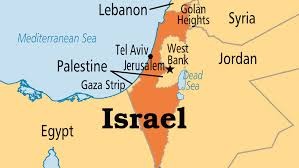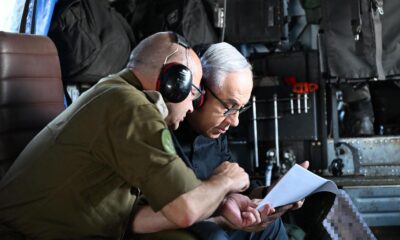NEWS
Israel Pounds Gaza With Over 300 Strikes A Day

Israel has pounded the Gaza Strip with over 300 airstrikes within a space of one day.
Israeli authorities admitted this on Monday, while authorities in the Gaza Strip, including the Hamas wail that the heavy bombing has left dozens of people killed, maimed and displaced.
Biztellers reports that this is happening barely a fortnight into the war triggered by the October 7 Hamas attack on Israel which took over 1,400 lives with many led captive and still being held by the Hamas.
Israel’s reaction to defend its territory and secure the release of her citizens held captive in the Palestinian territory has led to hostilities with humanitarian crisis in the Gaza Strip.
As things stand, the Hamas-run health ministry saidd that more than 4,650 have been killed in the Gaza Strip, with almost 40 percent of them said to be children.
They also claim that that thousands of buildings have been brought down. The Gaza authorities put the number of people displace by the hostilities at over a million, most of them civilians.
Succour is, however, trickling in for the displaced human population, with the third convoy of aids-conveying trucks, reported to be about a dozen, arriving the Gaza Strip from Egypt on Monday.
The trucks were said to have come in through Rafah, the Gaza Strip’s only crossing not under the control of Israeli forces.
Recall that the United States of America (USA), while brokering the entry of the aid convoys, assured of a “continued flow” of relief goods into the Gaza Strip.
It was gathered that as part of efforts to obliterate the Hamas, Israel had cut off water food, power and fuel supplies to the Gaza Strip.
Fighting raged all through Sunday night with Israeli Prime Minister, Benjamin Netanyahu sticking to his guns, that Israel would “erase Hamas”.
Concerns are widening globally, as the air strikes are generally perceived to precede a full-scale ground invasion, for which Islamic forces, sympathetic to the Hamas might be tempted to join the war.
On the casualties, the Gaza’s Hamas-controlled government media office said that “more than 60 were martyred in the raids” during the night, including 17 in a single strike that hit a house in northern Gaza and at least 10 others were killed in new strikes on Monday morning.
On its part, the Israeli military said it had hit “over 320 military targets in the Gaza Strip” in the 24 hours up to Monday morning.
It said the targets “included tunnels containing Hamas terrorists, dozens of operational command centres” as well as “military compounds and observation posts” used by Islamic Jihad, another militant group.
A resident of Rafah, Mohammed Abu Sabalah was quoted by global media as saying that he returned home from the local mosque after dawn prayers Monday and that “a quarter of an hour later there was a bombing”.
“We couldn’t see anything because of the thick smoke,” he said, adding that “we thank God that we’ve emerged safe and sound” with “only a few windows and doors destroyed” in his house.
In readiness for the ground invasion, Israeli forces are massed around the Gaza Strip border. Local sources maintained that smaller units had already carried out limited incursions, targeting the Hamas and hoping to rescue hostages, whose number Israel now estimates at 222.
In one such operation, a 19-year-old Israeli soldier was killed and three others wounded, the army said, adding that the tank operation had aimed “to dismantle terror infrastructure… and locate missing persons and bodies”.
Tensions have been inflamed in the occupied West Bank, where 95 Palestinians have been killed in clashes involving Israeli security forces or settlers since fighting began in Gaza, according to the Ramallah-based health ministry.
NEWS
Moghalu Prescribes Good Governance As Panacea To Ethnic Agitation

The President of the African School of Governance, Kingsley Chiedu Moghalu has admonished state actors against resorting to brutal force in the bid to muscle out separatist agitators.
In the aftermath of Mazi Simon Ekpa, the Finland based Biafran nationalist agitator being caught in legal web and the Nigerian government moving swiftly to seek his repatriation, the former deputy governor of the Central Bank of Nigeria (CBN) has cautioned that ‘We either fix our problems, or our problems will eventually “fix” us. No alternative to a renegotiated union.’
ALSO READ: Finnish Police Arrest Simon Ekpa Over Terror-Related Allegations
The political economist, while expressing his hope in Nigeria, made it clear that “hope is not a strategy”.
He bared his mind in a series of posts on his verified handle on micro-blogging site, X on Friday.
Moghalu wrote, “Despite sustained contemporary difficulties, I am hopeful about Nigeria. But hope is not a strategy. We need to improve state capacity for effective governance.
“We either fix our problems, or our problems will eventually “fix” us. No alternative to a renegotiated union.
“We must learn to be honest with ourselves and address the root causes of our problems. Why ignore them, when the problem is actually quite solvable? The problem with continuing with this approach is that when the danger crystallizes, those who thought they were benefiting from
NEWS
N1.7trn Loan: Atiku Blames NASS For Worsening Nigeria’s Debt Burden
Former Vice President, Atiku Abubakar has criticized the federal government’s plan to secure an additional N1.7 trillion loan through Eurobonds to cover a shortfall in the 2024 budget, describing the borrowing as unsustainable and harmful to Nigeria’s economy.
In a statement shared on Thursday via his X (formerly Twitter) handle, Atiku accused the Bola Tinubu-led administration of burdening Nigerians with debt while failing to provide clear answers about the country’s fiscal challenges.
READ ALSO: CSR: Dangote Cement Fuels Education With Support Projects At Lagos Schools
He also faulted the National Assembly for enabling what he called a “voracious appetite” for loans.
The former Peoples Democratic Party (PDP) presidential candidate expressed alarm over a recent World Bank report ranking Nigeria as the third most indebted country to the International Development Association (IDA), calling the development troubling.
“The recent report released by the World Bank, showing Nigeria as the third most indebted country to the International Development Association (IDA), is very concerning,” Atiku stated.
He raised further concerns about the government’s decision to benchmark the proposed loan at an exchange rate of 1 USD to N800, despite the Central Bank of Nigeria’s official rate being over N1,600.
“What makes this particular loan proposal even more concerning is that it is benchmarked at the exchange rate of 1 USD to N800, whereas the current exchange rate from the Central Bank of Nigeria stands at over N1,600 to 1 USD,” he said.
Atiku questioned the need for additional borrowing, given the government’s earlier claims of record-high revenue collection.
“In July this year, Tinubu boasted that the FIRS and Customs under his watch had collected all-time high revenues to finance the budget. Why are they still borrowing?” he said
He accused the government of a lack of transparency, describing the borrowing spree as detrimental to Nigerians already struggling under economic hardship.
“There is something that they are not telling Nigerians, even as they are being crushed by a combination of their failed trial-and-error policies and loan rackets.”
Atiku also referenced a report by BudgIT, a budget monitoring group, which criticized the 2024 budget for its inefficiencies.
He alleged that corruption, rather than infrastructure or development needs, was driving the government’s borrowing decisions.
“These loans are powered by corruption and not for infrastructure and development needs. This voracious appetite for humongous loans is deeply concerning,” he said.
Reflecting on Nigeria’s financial history, Atiku lamented the return to significant foreign indebtedness just years after former President Olusegun Obasanjo’s administration cleared the country’s debt.
“It is agonizing to see that just a few years after the Obasanjo administration took us out of foreign indebtedness, we are today back at the top spot in the same conundrum,” he stated.
He called for a more cautious approach to borrowing, urging the government to prioritize fiscal responsibility and transparency to avoid worsening Nigeria’s economic challenges.
International News
ICC Issues Arrest Warrants For Israeli Prime Minister Netanyahu, Others
The International Criminal Court (ICC) has taken a historic step, issuing arrest warrants for Israeli Prime Minister Benjamin Netanyahu and former Defense Minister Yoav Gallant.
The charges include crimes against humanity and war crimes allegedly committed during Israel’s recent assault on Gaza.
In a detailed statement, the ICC accused the Israeli leaders of “intentionally and knowingly depriving the civilian population in Gaza of objects indispensable to their survival, including food, water, and medicine and medical supplies, as well as fuel and electricity.”
READ MORE: Osun Govt Decries Attempted Murder Of Park Mgt Chairman By Police
The ICC’s move marks a significant escalation in international scrutiny of the Israeli-Palestinian conflict. Netanyahu and Gallant are alleged to have orchestrated policies that caused severe harm to the civilian population in Gaza, leading to widespread condemnation from human rights organizations.
Alongside the charges against Israeli officials, the ICC also issued an arrest warrant for Hamas military commander Mohammed Deif. Deif has long been a central figure in Hamas’s military operations. Israel’s military claims to have killed him in a July airstrike, although this has not been independently verified.
The warrants highlight growing calls for accountability amid the ongoing conflict in the region. The ICC’s actions are likely to provoke heated debate and may complicate diplomatic efforts aimed at resolving the crisis.
With the warrants issued, global attention now turns to how the international community will respond and whether any practical steps will be taken to enforce them.














